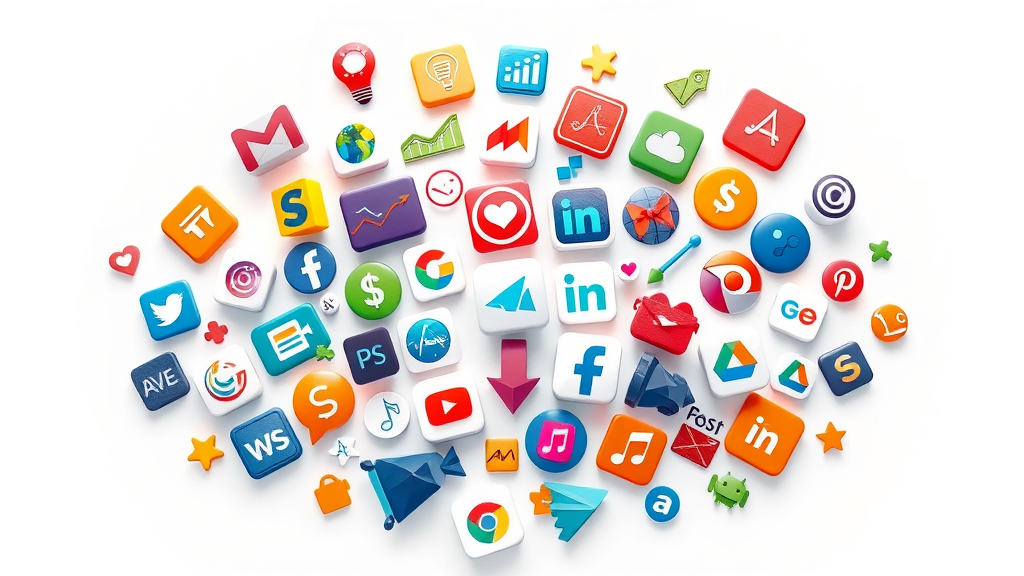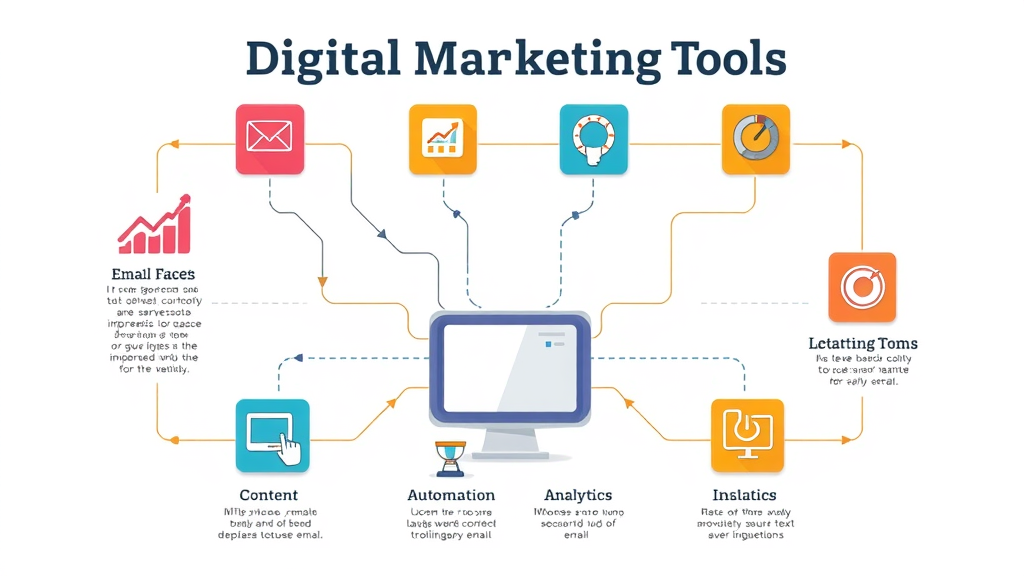Companies using digital marketing tools are 60% more likely to boost sales in their first year! This incredible stat reveals just how crucial powerful marketing software and automation platforms have become for staying ahead of the competition. In this comprehensive listicle, you’ll discover why top brands trust digital marketing tools to streamline campaigns, increase their ROI, and make every marketing effort count.
Unlocking Success: How Digital Marketing Tools Transform Results
Did you know companies using digital marketing tools are 60% more likely to see increased sales in the first year? Discover why top brands rely on advanced marketing software to outpace competition and automate digital campaigns for maximum ROI.
Investing in digital marketing tools can be the difference between a struggling marketing campaign and sales success. With the rise of automation, integrated platforms, and intelligent dashboards, businesses can launch, track, and optimize campaigns with ease. Top brands leverage robust marketing software that unifies everything from social media management and content marketing to analytics and lead generation.
For example, a small business owner can use an email marketing tool like Mailchimp to automate email blasts, while a marketing team may prefer all-in-one solutions such as HubSpot for advanced segmentation, A/B testing, and deep insights through Google Analytics. No matter the size or focus, digital marketing tools have become essential for saving time, reducing human error, and driving up sales across every digital channel.

What You Need to Know About Digital Marketing Tools
Define digital marketing tools and their growing importance. Explore the impact of marketing automation, marketing software, and integrated marketing platforms on the digital marketing landscape. Practical examples of how businesses streamline operations with content marketing, social media management, and SEO tool integrations.
Digital marketing tools are software or platforms designed to automate, enhance, or simplify different aspects of a business’s online marketing activities. Their ascendance is propelled by the need for efficient workflows, data-led decision-making, and the competitive advantage of real-time campaign adjustments. Marketing automation software, for instance, can instantly nurture prospects through email drips or trigger ads based on user behavior, while comprehensive marketing platforms offer a single dashboard for managing everything from social media to SEO and paid search engine marketing.
Businesses now routinely integrate content marketing tools for streamlined production and scheduling of blog posts, use social media management solutions like Buffer or Hootsuite to time and analyze posts, and rely on SEO tools like Ahrefs or SEMrush to ensure their sites rank high in Google search results. This integration spans the full spectrum of marketing efforts: one tool may track your site traffic, another may automate your media management, and a third may help you create, publish, and analyze content—all syncing seamlessly to maximize your overall digital marketing impact.
Comprehensive Digital Marketing Tools List to Skyrocket Your Sales
A rundown of powerful digital marketing tools, including marketing automation, project management, email marketing tools, and social media management solutions. Highlight media management platforms, landing page builders, search engine optimization software, and analytics dashboards for 2024 and beyond.
As competition intensifies, leveraging the right digital marketing tools can push your business to the top. Here’s a curated list of the most vital marketing software and platforms across major categories:
Marketing Automation: HubSpot, Marketo, Mailchimp
Email Marketing Tools: Mailchimp, Constant Contact, ConvertKit
Project Management: Asana, Trello, Monday.com
Social Media Management: Hootsuite, Buffer, Sprout Social
SEO Tool Platforms: SEMrush, Ahrefs, Moz
Landing Page Builders: Unbounce, Instapage, Leadpages
Analytics: Google Analytics, Hotjar, Tableau
Media Management: Canva, Adobe Creative Cloud
site traffic

Comparison of Digital Marketing Tools | |||
Feature |
Best Use Case |
Pricing |
Key Benefit |
|---|---|---|---|
HubSpot |
All-in-one automation & CRM |
Free & Paid |
Seamless integration of marketing & sales |
Hootsuite |
Social media management |
Paid (Free plan available) |
Unified scheduling & analytics |
SEMrush |
SEO & content marketing |
Paid |
Comprehensive search engine optimization toolkit |
Mailchimp |
Email marketing & automation |
Free & Paid |
User-friendly interface, robust campaign management |
Asana |
Project management |
Free & Paid |
Collaborative task tracking for teams |
Essential Digital Marketing Tools for Social Media Success
Top Social Media Management Tools
Examine standout social media management platforms for scheduling, analytics, and content amplification (e.g., Hootsuite, Buffer). Discuss pros and cons for each tool to help readers choose the right one for their digital marketing strategy.
Dominating social media starts with robust social media management tools designed for scheduling, automation, and analytics. Platforms like Hootsuite allow you to manage posts across multiple social accounts, monitor engagement, and pull actionable reports—all from a single dashboard. Buffer excels at streamlined scheduling and content planning, making it a favorite among bloggers and small marketing teams. Sprout Social stands out with its sophisticated listening tools and detailed analytics for campaign measurement.
Each tool has unique strengths: Hootsuite offers deep integrations and a powerful free plan, Buffer boasts user-friendliness and clarity, while Sprout Social delivers advanced insights for data-driven marketing strategy decisions. Your ideal platform depends on your business’s size, channel mix, and whether collaboration or analytics is your main focus. The right digital marketing tool can mean real social media growth, better audience targeting, and higher ROI.

Integrating Social Media with Other Digital Marketing Tools
Strategies and marketing tool combinations to streamline workflow and maximize engagement across platforms. Cross-promote content marketing, leverage blog posts, and integrate with email marketing tools.
Smart integration is the foundation of successful marketing campaigns in 2024. Combining social media management tools with your content marketing platforms means you can create a blog post, schedule promotional snippets on Buffer, and amplify reach by targeting your email list—all in a few clicks. Connecting platforms like Hootsuite with a marketing automation tool or your email marketing tool ensures messaging stays consistent across every digital channel and every blog post gets its moment to shine.
For maximum efficiency, marketers often build workflows that trigger automated social posts when new content is published, while analytics dashboards track the impact on site traffic and conversions. This omni-channel approach not only saves time, but delivers a unified brand message at every customer touchpoint. As marketing automation and integration features become increasingly sophisticated, expect seamless connections between social, email, content, and analytics platforms to be the new standard of digital marketing excellence.
How Automation and Project Management Tools Save Time in Digital Marketing
Marketing Automation: The Core Digital Marketing Tool
Overview of marketing automation platforms—HubSpot, Marketo, Mailchimp—and their role in scaling digital marketing campaigns. Real-world use cases for marketing campaign management and lead nurturing workflows supported by marketing software.
Marketing automation software is the powerhouse of the modern marketing strategy. Platforms like HubSpot, Marketo, and Mailchimp streamline everything from email drips to lead segmentation and retargeting. By automating repetitive tasks, these digital marketing tools allow teams to focus on strategy and creative execution. In practical terms, automation platforms can send a targeted email to a segment whenever someone downloads a piece of content, assign warm leads to sales reps, and even sync marketing data with platforms like Google Analytics.
Real-world examples abound: an e-commerce brand may use HubSpot to nurture cart-abandonment campaigns or automate product recommendations based on customer behavior. A B2B SaaS company could build entire lead-nurture journeys with Marketo, score prospects, and accelerate pipeline movement—skyrocketing campaign results with less manual input. These marketing tools are no longer luxuries; for businesses serious about growth, automation is non-negotiable.

Project Management Tools for Coordinated Digital Marketing Campaigns
Collaborate and execute marketing strategies with project management tools like Asana, Trello, or Monday.com. Emphasize impact on team communication, campaign timelines, and managing large-scale digital marketing initiatives.
Every high-impact digital marketing campaign relies on exceptional organization and teamwork. Project management tools such as Asana, Trello, and Monday.com give marketing teams one centralized hub for tracking to-dos, campaign milestones, and deadlines. Visual dashboards make it easier to break down complex projects—like launching a new landing page or rolling out a multi-platform media management plan—into actionable steps with clear accountability.
These management tools are invaluable as businesses scale. They provide instant visibility into what each team member is working on, eliminate communication bottlenecks, and help marketing managers spot potential risks before they impact campaign timelines. For agencies, distributed teams, or brands managing multiple digital marketing initiatives, adopting a robust project management tool could be the smartest investment you make this year.
Optimizing Content Marketing with the Right Digital Marketing Tool
Content Marketing Tools for Consistent Brand Messaging
Detail how content marketing platforms drive blog post creation, curation, and distribution. Explore integration with marketing software and media management for seamless brand storytelling.
Impactful content marketing hinges on the ability to create and disseminate high-value blog posts with consistency and creativity. Content marketing tools—like CoSchedule, Contently, and HubSpot—allow businesses to brainstorm, plan, and publish blog posts across channels, all from a single interface. These platforms often include editorial calendars, idea boards, and performance tracking so you know exactly what resonates with your audience.
Seamless integration with media management suites (like Canva or Adobe Creative Cloud) means marketers can easily produce visually compelling infographics and multimedia, embedding them right into their blog posts. When connected to marketing automation software, these systems can nurture leads who engage with your blog content, triggering personalized email sequences or social posts. In a crowded digital landscape, using the right digital marketing tools ensures every message aligns with your brand’s voice and delivers results.

“Content marketing success depends on using the right digital marketing tools to reach, engage, and convert your audience—every time.”
Boost Conversions with Landing Page and Email Marketing Tools
Landing Page Builders as Essential Marketing Tools
Evaluate landing page creation software—Unbounce, Instapage, Leadpages—and their role in capturing leads, A/B testing, and enhancing digital marketing campaigns.
Capturing new leads and driving conversions begins with a frictionless landing page experience. Platforms like Unbounce, Instapage, and Leadpages let marketers build, test, and optimize landing pages without coding. Their templates, drag-and-drop interfaces, and easy integration with analytics and email marketing tools make them indispensable for campaign performance. With A/B testing, you can quickly see which headlines, images, or CTAs maximize sign-ups—an essential factor in scaling digital marketing campaigns.
Whether launching a new product, collecting webinar registrations, or offering a downloadable resource, these tools keep your funnel full and your customer journey seamless. For marketers, choosing the right landing page builder is about agility, ease of use, and the ability to measure and iterate on what works.

Email Marketing Tools and Automation for High ROI Campaigns
Assess Mailchimp, Constant Contact, ConvertKit for campaign automation, segmentation, and results tracking. Tips for maximizing conversions with integrated email and social media campaigns.
Email marketing remains one of the highest ROI channels, and tools like Mailchimp, Constant Contact, and ConvertKit put advanced automation, segmentation, and reporting at your fingertips. These platforms allow marketers to build highly personalized email campaigns, segment lists based on behavior or preferences, and automatically trigger follow-ups or exclusive offers. Through robust analytics, marketing teams can track open rates, click-throughs, and sales directly attributed to each campaign.
Integration with your social media management tools or content platforms extends your message’s reach even further. Imagine launching a new blog post and instantly sending a tailored email to subscribers most likely to engage, while automated social posts create buzz on every platform. This synergy not only boosts conversions, but ensures a cohesive experience for your target audience.
Mastering Data: Search Engine, SEO Tools & Google Analytics in Digital Marketing
Search Engine Optimization Tools for Higher Rankings
Explore the best SEO tool options (SEMrush, Ahrefs, Moz) for audit, optimization, keyword research, and link building. How these digital marketing tools relate to content quality and visibility in Google search and engine optimization best practices.
The difference between top-ranking blog posts and obscurity often comes down to the right SEO tool . SEMrush, Ahrefs, and Moz provide in-depth keyword research, backlink analysis, and on-page audit features to ensure your content is fully optimized for Google search and other search engines. These platforms surface critical insights about what your competitors are doing, which keywords are trending, and how your site measures up in terms of authority and user experience.
For digital marketers, the ability to act on this data means every piece of content is strategically crafted for maximum impact. From identifying technical SEO issues to tracking the climb of your landing page in search engine results, these tools are fundamental to a successful digital marketing strategy in 2024.

Measuring Success with Google Analytics & Reporting Marketing Tools
Step-by-step look at using Google Analytics and related marketing software to interpret campaign performance, track KPIs, and make data-driven decisions in digital marketing strategy.
Understanding how your digital marketing campaigns perform starts with Google Analytics . This free yet sophisticated marketing tool allows marketers to interpret campaign performance, monitor site traffic, and assess return on investment in detail. With custom dashboards and automated reports, business owners get direct insights into which marketing efforts are converting and which need to be adjusted.
Analytics software can be integrated with your project management tool or marketing automation platform, further enhancing your ability to optimize every campaign in real time. Data-driven decision-making is no longer optional; it is the backbone of digital marketing success.
Advanced Digital Marketing Tools for Specialized Needs
Tools for Influencer and Affiliate Marketing Campaigns
Platforms for finding, vetting, and managing influencer/affiliate campaigns. Explore automation, reporting, and fraud prevention as part of your digital marketing tool stack.
Influencer and affiliate marketing have become critical growth channels, and the latest digital marketing tools simplify campaign setup, execution, and measurement. Platforms such as AspireIQ, Impact, and Upfluence streamline the process of discovering, vetting, and tracking influencer partnerships or affiliate networks. Automated workflows ensure quick onboarding, while reporting tools reveal ROI and highlight the most effective partners.
Fraud prevention features, payment management, and real-time analytics help safeguard investments and maximize results, making these platforms essential additions to a scalable digital marketing strategy.

Emerging Marketing Software: AI and Future Trends
How AI-powered marketing software is shaping the future: predictive analytics, chatbot automation, and advanced personalization as next-gen digital marketing tools.
Emerging AI-powered marketing software is redefining what’s possible for digital marketers. Tools that harness machine learning now offer predictive analytics, helping anticipate customer needs and optimize marketing spend. Chatbots and conversational interfaces automate everything from customer support to lead collection on landing pages or social profiles, freeing up teams for higher-value initiatives.
Advanced personalization, powered by real-time data, allows brands to deliver individual experiences across every marketing channel. As these next-gen digital marketing tools evolve, expect your ability to engage, convert, and retain customers to become even more precise.

Qualitative Insights: Industry Quotes on Digital Marketing Tools
"The right digital marketing tools do more than automate—they empower marketers to focus on strategy and creativity for accelerated growth." – CMOs of Leading Brands
Quick Reference: Digital Marketing Tools Lists & Key Features
Condensed listicles highlighting the best marketing tools by function: content marketing, social media, management, analytics, email, and automation. Fast facts to guide digital marketing software choices.
Best Content Marketing Tool: HubSpot, for all-in-one content and analytics.
Top Social Media Management: Hootsuite and Buffer for scheduling and analytics.
Leading Analytics Platform: Google Analytics for campaign performance tracking.
Project Management Tool: Asana and Trello for workflow coordination.
Most Popular Email Marketing Tool: Mailchimp.
SEO Tool for Rankings: SEMrush and Ahrefs for keyword and competitor research.
Landing Page Builder: Unbounce, Instapage.

Top 10 Digital Marketing Tools in 2024 | |||
Platform |
Main Benefit |
Integrations |
Ease of Use |
|---|---|---|---|
HubSpot |
All-in-one automation & CRM |
High |
Excellent |
Mailchimp |
Email marketing automation |
Medium |
Very Good |
Hootsuite |
Social post scheduling |
High |
Great |
SEMrush |
SEO toolkit |
High |
Moderate |
Asana |
Project collaboration |
Medium |
Great |
Unbounce |
Landing page builder |
High |
Very Good |
Buffer |
Simple social scheduling |
Medium |
Excellent |
Ahrefs |
SEO & competitor research |
Medium |
Good |
Canva |
Media management/design |
Medium |
Excellent |
Tableau |
Advanced analytics |
High |
Moderate |
FAQs: Everything About Digital Marketing Tools
What tool is used in digital marketing?
Comprehensive look at major digital marketing tools: marketing automation, SEO tool, email marketing tool, social media management, analytics, etc.
A variety of digital marketing tools are used depending on the specific marketing function. Popular choices include marketing automation software like HubSpot for workflow automation, SEO tools such as SEMrush for site audits, email marketing tools like Mailchimp, social media management platforms like Buffer, and analytics tools like Google Analytics. Each specializes in automating, optimizing, and scaling specific aspects of digital marketing to drive better results.
What are the 7 types of digital marketing?
Short descriptions of the 7 key types: content marketing, email marketing, social media marketing, SEO, search engine marketing (SEM), affiliate marketing, and influencer marketing. How digital marketing tools power each type.
The 7 main types of digital marketing are:
Content Marketing : Uses blog posts, infographics, and video (e.g., Content platforms, CMS).
Email Marketing : Direct communication through campaigns (Mailchimp, ConvertKit).
Social Media Marketing : Engaging audiences on social platforms (Hootsuite, Buffer).
SEO (Search Engine Optimization) : Optimizing for search engines (Ahrefs, SEMrush).
Search Engine Marketing (SEM) : Paid ads and PPC (Google Ads, Bing Ads).
Affiliate Marketing : Partnering with affiliates for referrals (Impact, Commission Junction).
Influencer Marketing : Leveraging social influencers (Upfluence, AspireIQ).
What are the 4 major types of digital marketing?
Succinctly covers 4 primary types: search engine marketing, social media marketing, content marketing, and email marketing—linking main digital marketing tools for each.
The 4 main types of digital marketing are:
Search Engine Marketing (SEM/SEO): Tools like SEMrush and Google Ads optimize visibility.
Social Media Marketing: Managed via Hootsuite, Buffer, and Sprout Social.
Content Marketing: Implemented with HubSpot, CoSchedule, and WordPress.
Email Marketing: Automated using Mailchimp, Constant Contact, or ConvertKit.
What are the 4 main marketing tools?
Lists and explains: marketing automation software, CRM systems, social media management, and analytics platforms.
The 4 essential marketing tools for any digital strategy are:
Marketing Automation Software (HubSpot, Marketo): For campaign and workflow automation.
CRM Systems (Salesforce, Zoho): For managing customer data and sales pipelines.
Social Media Management Tools (Hootsuite, Buffer): For content scheduling and engagement.
Analytics Platforms (Google Analytics, Tableau): For measuring campaign performance and site traffic.

Expert-Recommended Digital Marketing Tools for Every Business
Recommendations segmented by business size (startups, SMBs, enterprises). Matched digital marketing tools and marketing software for immediate impact and scalability.
Startups should leverage free or low-cost digital marketing tools such as Mailchimp (email), Buffer (social media management), and Google Analytics. SMBs will benefit from affordable, robust platforms like HubSpot Starter, Hootsuite Professional, and SEMrush Pro for scaling their content and search efforts. Enterprises can go all-in with full-featured marketing software such as Marketo, Salesforce Marketing Cloud, and Tableau for analytics, ensuring powerful integrations and enterprise-grade campaign management. Choose according to your current stage and scale up as your business grows.
Checklist: Selecting the Best Digital Marketing Tool for Your Needs
Step-by-step checklist and guidance on comparing digital marketing tools, evaluating marketing software, and integrating with your existing marketing platform. Factors: features, support, scalability, price.
Choosing the right digital marketing tool is crucial for growth. Follow this checklist:
Identify Your Core Needs: Content creation, social media, analytics, or automation?
Compare Features: Does the tool offer essential features for your campaigns?
Check Integrations: Will it sync with your CRM or marketing platform?
Evaluate Support: Is customer service responsive and helpful?
Assess Scalability: Can the tool grow with your business?
Review Pricing: Is there a free plan or transparent pricing?
Request Demos or Trials: Try before committing.

Key Takeaways: Achieving Results with Digital Marketing Tools
Recap the time-saving and sales-boosting benefits of leveraging digital marketing tools. Encourage implementation and ongoing assessment.
Digital marketing tools save time, automate work, and turn campaigns into measurable sales and growth. Adopt, integrate, and consistently assess your toolkit to stay ahead in the digital marketing race.
Chart Your Digital Marketing Success on Long Island
Ready to make waves on Long Island? Let’s chart your course today! Call 631 629 5553
To enhance your understanding of digital marketing tools that save time and boost sales, consider exploring the following resources:
“AI-Powered Marketing Software that Multiples Results | HubSpot”
This resource provides insights into how HubSpot’s AI-driven marketing platform can streamline your marketing efforts and enhance customer engagement.
“Marketing, Automation & Email Platform | Mailchimp”
This resource details how Mailchimp’s comprehensive suite of tools can help you automate your marketing campaigns and effectively manage your audience.
By leveraging these platforms, you can optimize your marketing strategies, save valuable time, and drive significant sales growth.
 Add Row
Add Row  Add
Add 




Write A Comment